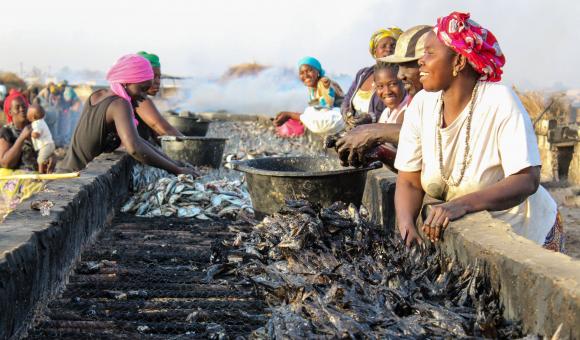
Joal-Fadiouth is a Senegalese community where fishing is the main occupation. The Jigeen Ñi Tamit programme supports ten women in developing their business in this domain.
At Fadiouth, nicknamed “Shellfish Island”, locals have been living off marine resources for several generations. While the men go out to sea, the women play a special role in transforming fish products. The techniques to transform seafood are passed down from mother to daughter, and the island is growing from all the empty shells left behind.
Diayi Ndour is one of these women, who has grown up in Fadiouth and learned the process of transforming seafood; this expertise was passed on to her when she was a child. A few years ago, she set up her own economic interest group, or GIE, called Mboha Yiff, in order to formalise the activity she had been doing for many years.
Every morning, Diayi and several other women from the GIE go off to gather seafood. In a dugout canoe they go in search of things such as “pañ” (pronounced pagnes), a shellfish variety that is in great demand – particularly for the thiebou gueja, as one of Senegal’s national dishes. They leave at low tide, crossing the areas uncovered by the tide and churning up the sand to discover the shellfish. Their search takes several hours in the full sun, but their efforts are often rewarded. Once gathered, the “pañ” must rest for a night. The women can therefore return to their domestic chores until the following day. The second step is to cook and peel them. For this, the women have a very special technique. They seize the boiling shellfish from the cooking pot with a large ladle and tap them against the lid of the casserole in order to open them. Then, they are sorted in order to recover the flesh alone, which they leave to dry in the sun. A few hours later, the “pañ” are ready to be packed up and sold!
This GIE, like 7 others in the same community, has been selected to benefit from the Jigeen Ñi Tamit programme. This assistance, implemented by the APEFE, in partnership with the Ministry for Women, the Family, Gender and Child Protection (MFFGPE), is financed by the Belgian Development Cooperation (DGD). It supports active female organisations in the agri-food industry in their transformation of fruit and vegetables, milk and fish in the regions of Thiès and Louga.
Diayi Ndour and her GIE have received a variety of training as part of the Jigeen Ñi Tamit programme. “We first received training on management and finance, then another on good hygiene. We recently had some marketing training at Thiès, together with women from the fruit and vegetables sector. It was a really good experience, as we were able to meet each other and develop partnerships. This programme has been very beneficial. Our GIE is now better organised, we have an accounts register and will soon receive authorisation from the FRA, which will allow us to guarantee the quality of our products and market them officially!”
